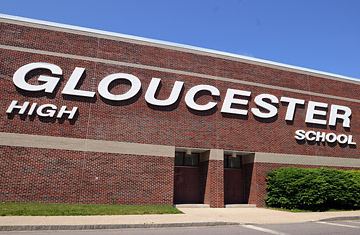
Gloucester High School, Gloucester, Mass.
You know you've found a perfect cultural touchstone when everyone brushes past it on the way to opposite conclusions. The tale of the Gloucester High School pregnancy pact has exposed many culprits, many causes and much confusion over what it actually tells us about anything larger than the luck and judgment of 17 now infamous teenage girls.
When my TIME colleague Katie Kingsbury first quoted Gloucester principal Joseph Sullivan as saying the reason pregnancies at his school quadrupled this year was that a group of sophomore girls "made a pact to get pregnant and raise their babies together," the story made headlines from here to Australia — but no one could agree on what it meant. If only Massachusetts hadn't rejected federal funds for "abstinence only" education, lamented Tony Perkins of the Family Research Council. If only the school health clinic had been allowed to dispense birth control pills, countered its medical director Dr. Brian Orr, who resigned over the contraception ban. If only President George W. Bush's No Child Left Behind Act hadn't diverted funds from after-school programs and better health education, charged Gloucester mayor Carolyn Kirk. If only Mars had not been in Leo in the Eighth House, suggested Monica at AstrologyMundo, who had predicted a flare-up of teen sexual activity around the summer solstice.
The culture was an especially irresistible target, after a year of hit movies like Juno and Knocked Up that "glamorized" unwed motherhood. Some blogs hosted a righteous orgy of "slutshaming," denouncing Gloucester's "marauding narcissistic sluts" for following the toxic example of movie stars and the Spears sisters, and longing for the return of the scarlet letter. But I wonder if the critics would be so quick to condemn if they flipped the story and viewed it another way.
There is certainly troubling anecdotal evidence that some of the girls set out to get pregnant together, though Mayor Kirk went to great lengths to deny any evidence of a "blood-oath bond." But other girls, like Lindsey Oliver, tell of a different kind of collaboration: "There was a group of girls already pregnant that decided they were going to help each other to finish school and raise their kids together," she told Good Morning America. Which raises the question: What if the "problem" in evidence at Gloucester High has more to do with the rejection of abortion than the acceptance of teen pregnancy?
It is easy for a school to know how many students give birth in a given year, but it is impossible to know how many pregnancies are terminated — especially in a heavily Catholic town like Gloucester. Birthrates are not the same as pregnancy rates, and the national trends for both tell an interesting story. While 750,000 teens become pregnant every year, that number is at its lowest level in 30 years, according to the Guttmacher Institute, down 36% from a peak in 1990. This does not suggest that we are witnessing a mass moral collapse, especially since abortion rates have fallen even faster. According to the Centers for Disease Control and Prevention, since the late 1980s the abortion rate for girls ages 15 to 17 fell 55%, and this year the overall U.S. abortion rate was at its lowest level since 1974.
At the same time, we are in the middle of a baby boomlet. Fertility rates in the U.S. are now higher than in most industrialized countries; the 4.3 million babies born in 2006 were the most since 1961. And among teenage girls, the birthrate — though it generally has been falling for the past two decades — did rise 3% in 2006 for girls ages 15 to 17. No one can quite explain why this is.
Which brings us back to Gloucester. What if the visible leap in pregnancies is part of a different trend: kids aren't necessarily having more sex or more girls aren't getting pregnant, but more of those who do are deciding to keep the baby rather than abort it. In Oliver's case, she was on the Pill and the pregnancy was unintended. She made her own "pact" with friends, she said, after they were already pregnant, so they could help one another get through it together. She and her boyfriend, a 20-year-old community college student, talked about trying to do the right thing in a difficult situation. Celebrities had nothing to do with anything. "I don't get why people think those movies are glamorizing it," Oliver told GMA, and even Juno at one point says she just wants to "squirt the kid out and get on with [her] life," which hardly counts as romanticizing teen motherhood.
Whether a girl or a woman decides to end a pregnancy or see it through is as complex an emotional, moral and medical calculation as she will ever face. But I wonder if some soft message has taken hold, with the data suggesting that more and more women facing hard choices are deciding to carry the child to term. This has been the mission of the crisis-pregnancy-center movement, including the more than 4,000 centers and hotlines and support groups across the country that aim to talk women out of having abortions and offer whatever support they can. If not in Hollywood then certainly in Gloucester, teen parents and their babies face long odds against success in life. Surely they deserve more sympathy and support than shame and derision, if the trend they reflect is not a typical teenager's inclination to have sex but rather a willingness to take responsibility for the consequences.
